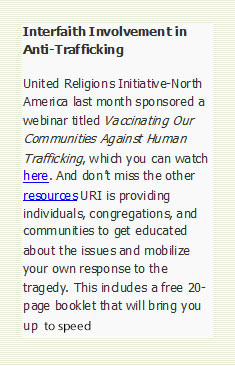By Gail Hambleton
THEY USED TO CALL IT SLAVERY

I have worked on initiatives in Rwanda after the 1994 Genocide, and have done humanitarian and mission work in different African countries engaged in war for eight years. More recently I was working in Nepal with children who had been orphaned by the civil war.The deep suffering of humanity in developing countries has always captured my heart and my attention, until now.
The more subtle, yet profound emotional suffering of the victim of human trafficking (both American and foreign), has shocked me to my core as I have heard survivors tell their stories. Hence the Safe Haven Campaign, Interfaith Alliance to Abolish Human Trafficking was launched.
I tend to “dream big.” In the United States and Canada the federal agencies and law enforcement are doing a “yeoman’s job” on combating human trafficking, which is at a crisis level. During a crisis, it is difficult to give time and attention to prevention. Public awareness generates community tips, which lead to cases.
Getting Educated and Going to Work

What if every faith center and house of worship would commit to educate themselves on this issue, and then become catalysts for a broader public awareness in their neighborhoods and cities? It is time to work together to end this scourge in our world.
Let us remember the words of two famous faith leaders of the past. Mahatma Gandhi said, “A nation’s greatness is measured by how it treats is weakest members.” Even more to the point, Dietrich Bonheoffer, a famous German Christian during WWII, said, “The test of the morality of a society is what it does for its children.
All faith communities need to protect their families and children from traffickers. Spreading public awareness on this issue does real and permanent good for humanity. In the U.S.A. we are seeing unprecedented partnering between federal agencies, state agencies, nonprofits, law enforcement, and faith communities, all of which make up the “anti-trafficking movement.”
This is extremely encouraging and could become a model for combating other social issues. My hope is that all the diverse faith communities could also work together arm in arm on this issue, which is such a debasement to our common humanity. My prayer is that diverse people from all walks of life and all faith perspectives can work together based on the many universal principles that we all hold dear; freedom, compassion, and justice.
This article was originally published by URI-North America.

